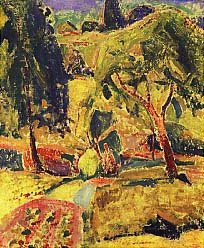
Alfred Maurer (1868-1932) – Self-portrait with a Hat (1927)
Here we see Alfred Maurer as he saw himself in 1927, five years before his death. He looks out at us with a rather stoic look in sepia tones, quite different from the colors he used in his other paintings of that period. The bow tie hangs limply from the collar of his wrinkled white shirt. His hat provides a bit of decorum from earlier in the day. His pursed lips and blank stare seem to indicate he has little to say at this point. What happened to the gay, happy Alfy who once roamed the streets of Paris? When he painted this, he had already lived twelve years with his father after returning from Europe because of the outbreak of WWI. What happened in that house between Alfred and his father Louis?
Amy's post about Alfred Maurer and his father reminds me of some of my friends who are still seeking the acceptance and love of their fathers. Looking at Maurer's last painting (our featured artwork of the week) in honor of both George Washington and his own father's 100th birthday, I'm reminded of the emptiness that these men, including Alfred, must have felt and some still feel. None of us knows what happened between Alfred and his father Louis on a daily basis. There are reports that Louis watched his son paint while standing on a stool looking through Alfred's bedroom transom window. Whether Louis did or not we do know that during the seventeen years they lived together before their deaths, Louis never accepted Alfred's painting style. Alfred never returned to Europe after World War I as he had originally thought he would. It seems the wound between the two men opened more and more each year. What a terrible way to live. And Maurer's choice in death was just as terrible, hanging himself in the doorway of his father's bedroom. Suicide leaves the lives of those left behind in such disarray. In this case, his brother Charles and his sister Eugenia Furstsenberg were left to handle not only Maurer's paintings but also to deal with the emotions suicide leaves with those still living. My heart aches for them all.
Native American poet Dick Lourie wrote this poem about fathers and sons...
"How do we forgive our fathers?
Maybe in a dream?
Do we forgive our fathers for leaving us too often?
Or forever, when we were little?
Maybe for scaring us with unexpected rage, or making us nervous
because there never seemed to be any rage there at all?
Do we forgive our fathers for marrying or not marrying our mothers?
or for divorcing or not divorcing our mothers?
And shall we forgive them for their excesses of warmth or coldness?
Shall we forgive them for pushing or leaning, or shutting doors?
for speaking thru walls, or never speaking, or never being silent?
Do we forgive our fathers in our age, or in theirs?
Or in their deaths, saying it to them, or not saying it.
If we forgive our fathers, what is left?"
Unitarian Universalist Church of Buffalo: Pride for Fathers
 Since today is our last day with Alfred Maurer, I decided to seek out some happier moments in his life. Alfy, as he was known in Europe, was a very happy dapper man, well thought of and considered by many to be a great artist. He loved the night life and painted this scene (Le Bal Bullier), one which he must have loved because he submitted it to many shows. Alfy was well known by Gertrude Stein; she remembered last seeing him in Europe with his "girl" just before he left Europe at the start of World War I. He feared she would fall into enemy hands but felt forced to leave because his father had cut off his money in an effort to have him return to New York. That is the last mention I've found of a time when Maurer smiled and enjoyed himself.
Since today is our last day with Alfred Maurer, I decided to seek out some happier moments in his life. Alfy, as he was known in Europe, was a very happy dapper man, well thought of and considered by many to be a great artist. He loved the night life and painted this scene (Le Bal Bullier), one which he must have loved because he submitted it to many shows. Alfy was well known by Gertrude Stein; she remembered last seeing him in Europe with his "girl" just before he left Europe at the start of World War I. He feared she would fall into enemy hands but felt forced to leave because his father had cut off his money in an effort to have him return to New York. That is the last mention I've found of a time when Maurer smiled and enjoyed himself. 
















